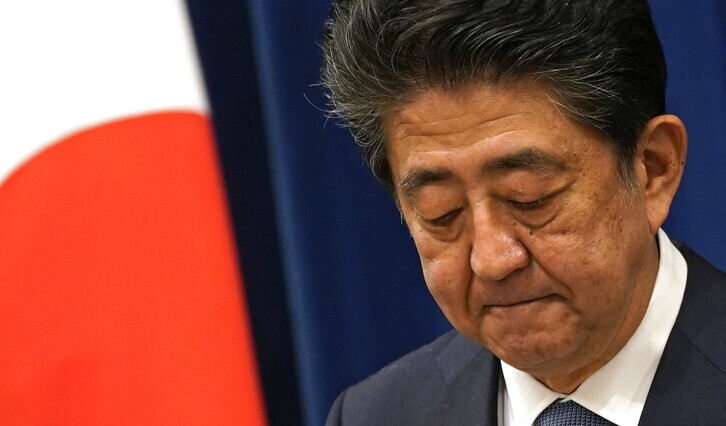hankyoreh
Links to other country sites 다른 나라 사이트 링크
[Column] What can the rest of the world learn from Abenomics?

Recently, Shinzo Abe stepped down as the prime minister of Japan. The chief legacy he left behind is “Abenomics,” an approach that sought to revive the Japanese economy from its long-term recession and deflation. With its similar demographic changes and economic structure, South Korea has watched Japan closely as representing a possible future. Abenomics has also been a focus of attention for other advanced economies that have lately become deeply concerned about “ending up like Japan,” with low growth and deflation, an aging population, and rising government debt.
Abenomics was half a success and half a failure. Economic growth did recover somewhat, but the Japanese economy was back in a recession by the fourth quarter of 2019. There are hopeful signs that it is escaping deflation, although it failed to meet its target of 2% inflation. The employment rate rose from 56.5% in 2012 to 60.6% in 2019 thanks to large increases among senior citizens and women in particular, but the rise in wages has been weak, with real wage levels lower in 2019 than they had been in 2012. Fortunately, hourly wages have increased, household income distribution has not worsened, and the labor income share ratio has recently recovered. But despite an increase in household disposable income since 2017, the savings rate has been growing and the rise in consumption has been stagnant amid uncertainties surrounding the future.
Importance of consistent expansionary macroeconomic policiesSo, what has Abenomics taught us? To begin with, it underscores the importance of consistent expansionary macroeconomic policies by the government to triumph over long-term recession conditions. Abe’s first target in getting Japan’s conservative banks to take action was to lay the groundwork for the economy’s escape from stagnation and recovery through lower interest rates and depreciation of the yen. To be sure, monetary policy could only achieve so much in stirring people’s hopes for inflation.
A second lesson is that we shouldn’t worry too much about a high government debt ratio. Abenomics was a focus of heavy skepticism due to the Japanese economy’s severe fiscal issues, with government debt exceeding 230% as a proportion of national income. But amid the economic recovery and escape from deflation, nominal national income rose from 494.4 trillion yen (US$4.73 billion) for the 2012 accounting year to 552.5 trillion yen (US$5.28 billion) as of 2019. Tax revenue also increased as consumption taxes were hiked. Thanks to the ongoing purchase of government bonds, the central bank now possesses around 47% of them, while the 10-year government bond interest rate stands at zero. Since government expenditures did not actually increase all that much under the Abe administration, the fiscal deficit and value of government bonds issued declined as percentages of national income, while the government debt ratio stabilized.
Some have argued that while fiscal expansion was the right approach, it was also inadequate, citing the issue of two consumption tax increases that only succeeded in triggering a downturn. As of the second quarter of 2020, the economic growth rate was down 7.9% from the previous term amid the impact on the COVID-19 pandemic. In response, the Japanese government undertook large-scale expansionary fiscal measures amounting to around 10% of national income, including cash payments of 100,000 yen (US$956) to all citizens and support for rent and employment retention for the self-employed and companies. Government debt may rise in the short term, but averting a severe economic recession will boost growth and finances in the long run.
Restoring macroeconomic structural balanceThe final lesson of Abenomics concerns the pivotal importance of restoring macroeconomic structural balance for the sake of a healthy economic recovery. Amid factors such as a rise in the number of irregular workers, wage increases in Japan fell far short of the rise in productivity during the 2000s. The Abe administration encouraged a rise in wages with its messages, but there was only so much it could do. Stable consumption and an increase in aggregate demand are difficult to achieve without a balance between labor and capital. Many have stressed the need for a wage hike as a fourth approach, and the Japanese government has taken legal measures to abolish discrimination against irregular workers while working continuously to increase the minimum wage.
The new administration is led by Yoshihide Suga, who had been the face of the Abe administration, and it is expected to carry on the Abenomics legacy in terms of macroeconomic policy. Speaking with the press, Suga has been more positive about Abenomics than other candidates, saying he would give it a grade of “90%.” In press conferences, he has emphasized proactive government response measures to ensure job retention. A past critic of the bureaucracy’s vested interests, he appears likely to pursue measures including regulatory reform, digitization of the administration, reductions to communications charges, and reforms to regional banks.
The Japanese economy has often been called “where macroeconomics goes to die.” The reason has to do with the way economic common sense does not seem to apply there: prices fail to rise despite a zero interest rate, and wages do not rise despite low unemployment. With the US and the countries of Europe now encountering similar phenomena, Japan may have simply been first to experience the future that awaits the rest of us. Abenomics may be over now, but the administration’s efforts to battle recession will continue, regardless of the name attached. The important thing is not to forget that it’s about more than just macroeconomics -- it’s about political economics too.

By Lee Kang-kook, associate professor of economics at Ritsumeikan University
Please direct comments or questions to [english@hani.co.kr]

Editorial・opinion
![[Column] Park Geun-hye déjà vu in Yoon Suk-yeol [Column] Park Geun-hye déjà vu in Yoon Suk-yeol](https://flexible.img.hani.co.kr/flexible/normal/500/300/imgdb/original/2024/0424/651713945113788.jpg) [Column] Park Geun-hye déjà vu in Yoon Suk-yeol
[Column] Park Geun-hye déjà vu in Yoon Suk-yeol![[Editorial] New weight of N. Korea’s nuclear threats makes dialogue all the more urgent [Editorial] New weight of N. Korea’s nuclear threats makes dialogue all the more urgent](https://flexible.img.hani.co.kr/flexible/normal/500/300/imgdb/original/2024/0424/7317139454662664.jpg) [Editorial] New weight of N. Korea’s nuclear threats makes dialogue all the more urgent
[Editorial] New weight of N. Korea’s nuclear threats makes dialogue all the more urgent- [Guest essay] The real reason Korea’s new right wants to dub Rhee a founding father
- [Column] ‘Choson’: Is it time we start referring to N. Korea in its own terms?
- [Editorial] Japan’s rewriting of history with Korea has gone too far
- [Column] The president’s questionable capacity for dialogue
- [Column] Are chaebol firms just pizza pies for families to divvy up as they please?
- [Column] Has Korea, too, crossed the Rubicon on China?
- [Correspondent’s column] In Japan’s alliance with US, echoes of its past alliances with UK
- [Editorial] Does Yoon think the Korean public is wrong?
Most viewed articles
- 1‘We must say no’: Seoul defense chief on Korean, USFK involvement in hypothetical Taiwan crisis
- 2N. Korean delegation’s trip to Iran shows how Pyongyang is leveraging ties with Moscow
- 3Amnesty notes ‘erosion’ of freedom of expression in Korea in annual human rights report
- 4[Column] Park Geun-hye déjà vu in Yoon Suk-yeol
- 5‘Weddingflation’ breaks the bank for Korean couples-to-be
- 6[Reportage] On US campuses, student risk arrest as they call for divestment from Israel
- 7[Editorial] New weight of N. Korea’s nuclear threats makes dialogue all the more urgent
- 8Why Korea shouldn’t welcome Japan’s newly beefed up defense cooperation with US
- 9[Guest essay] The real reason Korea’s new right wants to dub Rhee a founding father
- 10Will NewJeans end up collateral damage in internal feud at K-pop juggernaut Hybe?